#future mspa reader
Explore tagged Tumblr posts
Text
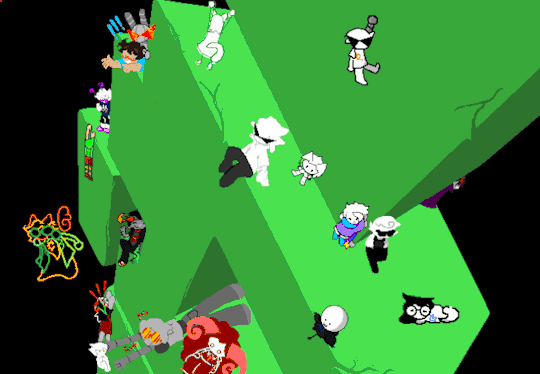
HAPPY 4/13
This was a really fun project and even if im not that active anymore i LOVE this community
(click for full resolution)
collab art with:
@kripsybac0n125
@badlydrawnaradia
@drawnroxystrider
@askdesperado-rocketchairs
@some-effort-trickster-jake
@badlydrawnjane
@poorlydrawneridan
@aaaaskarseniccatnip
@expertlydrawnroxy
@badlydrawnbabydirk
@askbronya
@badlydrawngcat
@badlydrawnjade
@badlydrawndirk
@badlydrawndavepeta
@badlydrawnlilseb
@badlydrawn-brostrider
#hs#homestuck#bdhs#mspa reader#future mspa reader#jade harley#dirk strider#bro strider#nepeta leijon#roxy lalonde#roxy strider#eridan ampora#gcat#robro#baby dirk#aradia megido#lil seb#jane crocker#trickster jake#jake english#davepetasprite#davepeta#bronya ursama#tavros nitram#art#pixel art#animation#4/13
650 notes
·
View notes
Text
Parasocial Relationships and the Author Self-Insert in Act 4 of Homestuck
On a hot summer’s day in the American Midwest, thirteen people sit around a table in a private, air conditioned room. For an hour we trade stories, take photos, ask and answer questions, give each other time to speak while waiting impatiently for our own turns, and thrill in the knowledge that today, we’re special: nobody besides us will ever experience this precise moment. At least, most of us feel this way. Ten of us have paid for the privilege of being here, seeking a social connection with people we only see through our TV screens, while the other three are being paid, their future paychecks dependent on the simulation of a friendship they can show us today. They’re practiced at this. They do their job well, and we’re satisfied with our purchase. The next time I meet these actors, they will remember my name, and I will glow with the knowledge that I am something more than their formless mass of indistinguishable fans. One decade later, I won’t remember anything we talked about, but I will remember that feeling of being known.
This is a snapshot of a 2010s fandom culture; one where the internet’s ability to break down barriers between fans and creators was seen as a universal positive, one where access to those creators was viewed as a status symbol, one where the term ‘parasocial relationship’ was safely hidden in academic literature, years away from reaching our own keyboards. This culture is in the past, now – but it is a culture that Homestuck both originated from and contributed to. From the comic’s first page, Homestuck fans have direct access to creator Andrew Hussie through MSPA’s dedicated forums, with a near-guarantee that the author will read their ideas if they’re posted to a suggestion thread. Hussie’s public persona is accessible through their forums, newsposts, blog posts, Formspring account and personal website, for any fan who wants to learn more about the comic’s creator. Then, in April 2010, the fictionalized Hussie appears within Homestuck itself, displaying this persona to all readers, even those who don’t seek active participation.
So I’d like to ask: How does Homestuck’s inclusion of a direct author insert affect the parasocial relationship that exists between creator and fans?
[disclaimer: this piece is not intended as a moral judgment towards anything discussed. I’m only aiming to describe a phenomenon and offer my own interpretation of it. to protect privacy and limit spreading old drama, I’ve anonymized all forum quotes and all names of fandoms, creators and fans, except for Homestuck, Hussie and myself.]
This essay is around 7k words below the cut and is also available on ao3. All cited articles in this post are available for free here.
Parasociality – an overview
The term ‘parasocial relationship’ has exploded in popularity throughout the 2020s, and it’s not surprising why. It describes a near-universal experience – not unique to young people or to those who participate in fandom, but encompassing the casual and one-sided intimacy a commuter feels towards the talk radio host they spend their mornings with, that a retired person feels towards the detective they’ve read so many novels about they they can predict the next words out of her mouth, or that a working-class voter feels towards a politician who presents himself as a down-to-earth man of the people. When coining ‘parasocial relationship’ in 1956, sociologists Richard Wohl and Donald Horton were most interested in applying it to television interviewers and game show hosts – people whose fame comes from the personality they present to the world – but believed it could extend to any public figure or fictional character, human or otherwise.
I’ve noticed that on social media, people describing a relationship as ‘more parasocial’ means ‘more inappropriate’, used when someone is seen as being too emotionally dependent on a celebrity or as causing that celebrity possible discomfort. In literature, ‘more parasocial’ means ‘further away from reciprocation’, and describes a spectrum that also includes mutual social relationships. So, it’s possible to have a parasocial relationship with a cool kid in the grade above at school, a singer in a local indie band, an actor in a major prestige TV show, and an elf in a fantasy novel, with each more parasocial than the last as the chances of these one-sided interactions becoming two-way social relationships decreases.
Understood this way, parasocial relationships aren’t problems in and of themselves. They’re an extremely common way humans relate to others, and can be a source of positive emotions – it has even been suggested that they are a ‘central prerequisite for media enjoyment’ (Vorderer et al., quoted in Stein et al., 2024). A meta-analysis of parasociality research (Tukachinsky et al., 2020) found that parasocial relationships were not more common among people who struggled to make social connections. They were more common when a person felt ‘long term identification’ and perceived similarity with a character or celebrity, experienced immersion in their content, was regularly exposed to the object of the relationship, and saw them as physically and socially attractive. A factor not explored by this study, but proposed by other researchers is wishful identification, where a person sees a character or public figure as someone they’d like to become.
Social media, then, becomes a fascinating site where a large portion of the social spectrum is collapsed into one. It opens channels where it’s possible for a household-name musician to create an account, ‘follow’ a number of their fans, ‘like’ their posts, and even invite the most dedicated fans to their house for a seemingly intimate get-together, creating a culture where fans define themselves by the number of times this musician has directly interacted with them. Taken to extremes, there are fan communities that seek to guide their favorite celebrity’s life and career. They feel ‘responsibilities’ and ‘duties’ towards the object of this relationship, expressing dissatisfaction in large numbers when their idol dates the ‘wrong’ partner or accepts a role in the ‘wrong’ TV show – Yan & Yang (2021) describe this in detail and interviews Chinese fans about their ‘co-creation of idols’. In 2010, Twitter, Tumblr and Reddit are all young platforms, and this new closeness and access between creators and fans is unprecedented and exciting on both sides.
Most existing analysis focuses on the parasocial relationships fans experience towards creators and public figures, but in truth, these relationships go both ways. First, many creators put in conscious work to craft a persona that will be attractive to fans, refining and updating this in line with changing demands from their audience. Perceived authenticity, for example, has long been valued among fans, so a public figure may try to cultivate this trait; however its ideal expression has changed over time. A singer-songwriter penning an ‘authentic’ pop song in 2010 might depict herself as the devastated and longing victim of a boyfriend’s cruelty who struggles to be understood by others, or conversely, as a fun-loving party girl who likes to chug beer and have casual sex – but both of these women will implicitly reassure listeners that they are heterosexual, neurotypical, and focused on others. In 2025, writing an ‘authentic’ pop song may involve the singer acknowledging her own serious flaws in her friendships or relationships, or discussing a serious struggle with mental health, body image, or the pressures of stardom. She’s more likely to describe a potential partner as ‘they’ instead of ‘he’, to be self-focused, and to use words from pop psychology. All this would have created backlash in 2010 as the ‘wrong’ kind of authenticity, but is celebrated and relatable today. In this way, a celebrity’s self-presentation merges with their fans’ beliefs and assumptions about them to co-construct a character: a fictionalized version of this real person who can be understood, predicted and judged in the eyes of the public.
Second, celebrities develop parasocial relationships with their own fans – this can be specific fans, or the ‘ideal’ or ‘archetypical’ fan they envisage. Sharon & John (2024) discusses these ‘inverse parasocial relationships that podcasters develop with their listener base. They describe how radio presenters are often advised to imagine a hyperspecific ‘typical listener’ to address their content towards, envisioning them as a full person present in the studio. Compared to radio’s broad audience and centralization, podcasters have to make names for themselves in a medium filled with options, and typically target a smaller niche of listeners – which, in itself, encourages parasociality as creators and fans can both see themselves as part of a ‘private club’ familiar with the podcast’s inside jokes and language. Interviewing specific podcasters, Sharon & John found that they conceptualize their fans in various ways, including ‘someone like themself’, ‘a specific person they know’, ‘people who really love them’, or even ‘imagined friends to assuage loneliness’. As such, public figures constructing their fans as a character often runs alongside their construction of themselves as characters.
2020s fan cultures, at least those I’ve participated in, tend to be critical of parasocial relationships and regularly challenge fans who are seen as crossing these boundaries. I believe this is an understandable reaction to the 2000s and 2010s culture where social media was in its infancy, and fans and celebrities alike were navigating how to interact with one another through these new possibilities, with no model for how best to do so. I’ve also noticed that fans put the onus on other fans to behave appropriately, and respect the real or imagined boundaries of creators. There’s far less discussion of celebrities’ roles in constructing these relationships and maintaining their disproportionate amounts of power within them, or of media platforms’ roles in encouraging these relationships in order to increase long-term engagement and ultimately, advertising revenue.
Even in communities that are critical of capitalist systems and power imbalances, this is often treated as an individual issue – surprising, given that in many cases celebrities choose to retain their public facing careers, while algorithms mean that social media users on many platforms have little control over the content they are exposed to, and people do not consciously choose who to form an emotional connection with. To speak personally, I’ve definitely acted towards celebrities in ways I now see as crossing a line and would not repeat, such as writing occasional RPF (real person fiction) or visiting a podcaster’s hometown after traveling for their nearby liveshow, to see places they’d referenced on air. I’ve also experienced celebrities exploiting parasocial relationships with myself and other fans, such as a writer beginning to actively participate in an adjacent fandom to their own work, then soliciting donations from these fans for their own next project, then disappearing without fulfilling their promise of continued participation. We all exist in the same social spectrum, and we all play roles in maintaining these dynamics.
Author inserts – an overview
Parasocial relationships have almost certainly existed for as long as public figures have. Similarly, author self-inserts have existed for as long as authors have. According to Dawson (2016), in the 1700s such inserts were seen as ‘digressions’ from the main narrative, and were an accepted convention even while they were contentious among readers largely as they slowed down the pace of the novel. Digressions were used for the author to provide moral or philosophical commentary, to share information that no characters have access to, and to discuss their own story, other influential stories, and the novel as a genre. In many cases they reinforced belief in the narrative, by arguing for why character actions and plot elements were plausible. By the 1900s, these inserts were seen as ‘intrusions’ into the narrative, being a ‘lazy’ storytelling method and breaking the now-established writing rule of ‘show, don’t tell’. They were now also seen as breaking a reader’s immersion in the story, reminding them of the actual reality that exists outside the fictional reality.
As such, the author’s direct presence left the primary narrative of most fiction, with the exception of postmodern and metafictional works which directly explore the concept of the author. However, the author remained present in other ways. Authors’ prefaces to a novel or interviews placed after the main text, director’s commentary tracks and ‘behind the scenes’ footage on a DVD, and lyric booklets with production notes from the band included with a record or CD, were all ways that the creator kept their presence and interpretation as close to their work as possible without affecting the storyworld itself. However, not everyone would read or listen to these, and they are generally considered ‘paratexts’ – supplemental material that frames the main text, but is not a part of it.
It’s not always clear cut when an author inserts themself into their narrative. Almost all fiction includes characters based on the author or their friends and family, fictional worlds based on the author’s experience of the actual world, or moral and political beliefs shared by the author. These can be analyzed although not objectively determined, even when the author discusses them in a paratext, as creators have plenty of reasons to misrepresent themselves to an audience. A screenwriter for a movie also playing its main character, a songwriter sharing the circumstances surrounding the song narrator’s recent breakup, and a novelist creating a main character who also writes novels for a living, may all be author inserts, but aren’t guaranteed to be.
The first experience I personally remember having with author self-inserts was through autobiographies. As a teenager, I read these as factual accounts of their subject’s lives, and didn’t question them further. This is known as the ‘autobiographical pact’, where a reader assumes that the writer, narrator, and main character of an autobiography are one and the same, and can translate knowledge of one to knowledge of the others. In reality, an autobiography is not a perfect window into its writer’s life – even someone who genuinely intends to represent themself truthfully will remember events imperfectly, fail to notice every personal bias, and construct a narrative from a sequence of unrelated events. An author can also purposefully misrepresent their life story to, for example, downplay their own privilege and inflate their struggles to present their achievements as individual success instead of coming from luck and help from others.
The genre of ‘autofiction’ (described in Schlick, 2020), acknowledges the fictionalization of the author’s life that exists in all autobiographical works, either exploring this theme directly or giving itself the artistic license to change true events without hiding this from the audience. Put another way, the author consciously creates themself as a character. Autofictional works can be novels, but exist across genre, such as the online ‘interactive life stories’ described by Chew & Mitchell (2015). Adding interactive elements means that the reader co-constructs the author-character’s life story along with the author themself. The same is true in metafictional video games, discussed by Pekanik (2024), where games may examine the ‘inevitable bond’ between game developers, narrators and players, and developers may insert avatars of themselves as characters to push back against the increasingly high expectations of story control, open-world possibility and ‘realism’ that players have for video games.
Outside of traditional media, the ‘self insert’ character is commonly associated with fanfiction, particularly with beginner fanfiction writers. In fan communities, referring to somebody else’s original fanfiction character as a ‘self insert’ is usually shorthand to suggest that the character is poorly written, one dimensional, a ‘Mary Sue’, and a form of wish fulfillment for the author. These stories are seen as self-indulgent, and taken less seriously than fanfiction that only includes characters from the source material. This judgment involves assumptions about the fanfiction author, and assumptions that the original work’s author is not writing a self insert. It also discourages writers from making original characters, in much the same way that widespread criticism discouraged late Victorian novelists from including authorial digressions.
As a fanfiction writer in the 2010s, I never wrote a direct self-insert or original character – I’m uncertain whether this was my personal preference, or influenced by their poor reputation. However, I openly wrote stories based on my real life, and gave details of myself to canon characters. In one example, I wrote an alternate universe fic where the characters attended my exact high school (disguised under a similar-but-different name) and attended school events I’d also been part of. In another, I and my girlfriend at the time both wrote fics based on our relationship and our hopes for its future, dedicated to each other but framed as a relationship between two canon characters. Taken without context, these fics were about their reader’s favorite characters, but taken alongside our author’s notes and interactions in comments, they allowed readers insight into our personal lives, and became author inserts.
This practice of using author’s notes to control the reception of fanfiction is fairly common. Unlike paratexts such as prefaces to a novel, fanfiction author’s notes often appear at the top or bottom of each chapter, or less commonly mid-chapter indicated by parentheses and (A/N:). They are generally in the same typeface as the main text and are consequently much harder to ignore when reading through a work. Maley (2020), discussing how fanfiction authors construct a persona, points out that once these author’s notes have been read, they cannot be separated from the text.
While not a traditional self insert, the information the author shares about their intent regarding characterization, their attitudes towards the source material, their own lived experience (such as whether or not the writer of a same-sex pairing is queer themself) or their plans for future installments, all affect the reader’s reception of the work. Comment interactions between author and readers can further reinforce this, as the author has the chance to directly refute any misconceptions their readers may have. Because of this, Leavenworth (2015) believes that author’s notes are ‘ultimately about authority and control’, imposing the author’s opinion of their own work onto other ways a reader may interpret it.
Another fanfiction trend is the reader insert, seen in ‘Y/N’ and ‘character x reader’ stories, where the reader is intended to replace prompts like ‘your name’ and ‘your hair color’ with their own personal details in a Mad Libs-style co-writing exercise. This takes the literary concept of an everyman – a character created to be generic and new to the fictional world so that the reader can see themself in the character’s place – to its logical extreme. Sapuridis & Alberto (2022) analyze how reader inserts often also function as author inserts, as the author places themself into the ‘you’ position while writing, and some inexperienced authors may accidentally slip into first-person pronouns, or make assumptions about traits of the reader that are also true of the author, such as being white or being female. While there is good reason to critique these assumptions, these reader insert fics place the author and reader as symbolically on the same level, as having the same desires and interests towards their favorite fictional characters and therefore sharing the same imaginary space. This is a clear contrast to the bid for control in author’s notes.
Webcomics occupy a similar space to fanfiction, as they have a similarly low barrier of entry for their creation, a similar lack of oversight by anyone concerned with marketing who may try to influence their content (such as network executives and publishing companies), and a similar status as ‘amateur fiction’. As original works, though, webcomics make a clearer distinction between creator and fans – this is even true of sprite comics, which use existing intellectual property – privileging the author even when they regularly interact with fans. This is in contrast to fanfiction, where authors and readers are members of the same fan community. Social divisions do exist in fanfiction communities based on author reputation and number of followers, hits and kudos, but this unofficial hierarchy is far more malleable than the firm divide between a webcomic’s creator and readers.
Author inserts are very popular in webcomics, with the TVTropes pages ‘Author Avatar’ and ‘Author Guest Spot’ indexing examples too numerous to list here – the second trope is stated to primarily feature webcomics as ‘more 'professional' or serious works tend to shy away from it’. To some readers in the 2000s, the trope feels ubiquitous, with fans anticipating that the author will eventually make an appearance in any new comic they begin. Author inserts in webcomics also tend to be explicitly metafictional and self-reflexive in webcomics as compared to fanfiction, whether that involves creating punchlines based on the lack of a fourth wall (see Thoss, 2011) or seriously exploring what it means for the comic’s author to influence the story.
Reader inserts and the second person ‘you’ pronoun are far less common in webcomics, however – comics may acknowledge the reader’s presence and even insult them for choosing to enjoy the work, but rarely invite their active participation. Author inserts tend to be explicitly the author as an individual or an embodiment of the work’s creator/god, instead of a shared identity that either author or reader may embody. One significant exception – a webcomic that directly acknowledges its readers in its concept, language, panel design, and occasionally narrative – is MS Paint Adventures, which in 2010 receives hundreds of thousands of visitors embodying its ‘you’ pronoun every day.
Homestuck, 2010
If public figures become characters by developing fictionalized personas of themselves and having these adopted by fans, and creators of fiction insert themselves in and around their work in both subtle and overt ways, it seems likely that these phenomena influence each other. Theory directly exploring this link is very limited, although one exception is Perot (2025), who discusses early twentieth century modernist novels’ exploration of the difference between a person’s public and private selves, their authors’ embodying this idea as ‘characters in real life’, and both of these as an early form of parasocialism. While Perot explores the author as a character and protagonists who are often read as self inserts, they don’t discuss explicit author inserts, and their work covers a time period long before the Internet.
Andrew Hussie’s MS Paint Adventures grew from the promise that readers could also be co-creators, symbolically placing them as equals in the relationship. It also grew from a forum community of friends – people with a direct, mutual social relationship – to a community of fans with widely varying levels of connection to the creator. Homestuck and its predecessor Problem Sleuth both attract large numbers of readers previously unfamiliar with Hussie, but if they choose, they can easily access a wealth of information about Hussie’s broader online persona as a larger-than-life Internet user via newsposts, interviews, blogs, a personal website, Formspring, and forums as either a reader or participant. All this is entirely optional, and fans can also choose not to engage, reading the work by itself while knowing very little about its author.
With Hussie still an active presence on their own forums, regularly making reference to taking ideas from fans even when they’re not posted directly in suggestion boxes, and with forum users becoming more ‘official’ collaborators by joining the music team, being asked for art and programming help, and having their forum adventures declared ‘semi-canon’, Homestuck involves a fairly unprecedented level of communication between creator and fans, especially for an audience of its size. The closest analogy may be early alternate reality games, such as 2001’s ‘The Beast’, promoting the movie A.I. Artificial Intelligence, written about by Janes (2020). In this game, participants solved three months’ worth of puzzles in 24 hours, forcing puppetmasters (game designers) to create content in real time as the game progressed, resulting in a dialog where creative solutions and fan speculation could be acknowledged within the game. However, these puppetmasters remained mysterious figures detached from real world identities until the game’s conclusion, unlike Hussie’s very public persona.
It’s clear from reading forum posts and Formspring questions that MSPA readers have a collective understanding of Hussie’s persona – a ‘fanon interpretation’ of their character in much the same way that they have a ‘fanon interpretation’ of John Egbert as a silly goober, Rose Lalonde as a delusional badass, Dave Strider as a genuinely cool guy, and Jade Harley as a ‘Mary Sue’. They view Hussie’s behavior as understandable, predictable, in some cases controllable, and worthy of admiration. There’s a few categories that posts tend to fall into, which together describe the parasocial relationship fans tend to have with Hussie.
1. As a creator, Hussie can do no wrong. This is the most common type of post by far, coming from fans who are completely in awe of Homestuck, blown away by flashes and plot twists, and awaiting the next update in full confidence that it will be just as good or better than everything up til now. Runs a full spectrum from seeing Hussie as a person who happens to be good at their job, to portraying them as a god worthy of worship.
‘I think I have to start worshipping him, or something soon, if not now.’
‘Using only his computer, Andrew has done what M. Night Shammy failed to do multiple times with a good budget and live actors.’
‘Is it ever disconcerting to think about exactly how many people idolize you or think you are incredibly awesome?’
2. Hussie’s such a dick (affectionate). Arguably the same as above, but filtered through ironic internet-speak, this typically occurs when fans notice a small detail (such as a hidden 413 or SBAHJ reference) and express this as mock-annoyance instead of amazement. Full spectrum from casual exclamations of frustration over cliffhangers to expressing concern over the state of Hussie’s mental health.
‘God damn it Hussie. You manipulative cur.’
‘Alright, it's things like that that make me afraid for Hussy's sanity.’
3. Hussie works ridiculously hard on this comic. People who are absolutely blown away by Homestuck’s fast update schedule and the high quality of its animations given their associated timelines, often involving personal comparison between Hussie’s constant output and their own procrastination or lack of motivation on tasks. Can include high hopes that eventually aren’t met, especially the belief that a Flash update will magically appear when one hasn’t been announced.
‘Hussie seriously puts more effort into every flash page than I ever have put into anything ever.’
‘Bugger me. The man is a machine!’
4. Actually, Hussie isn’t working hard enough. This includes people who are sad, annoyed, or even worried when a day goes past without updates, or express ‘it’s about time!’ when an update is finally posted, and people who attribute their own need to constantly refresh the MSPA website to Hussie. Also includes people who think Hussie is working on the ‘wrong’ things, such as too many ‘filler’ updates and not enough Flashes.
‘Good Gods but that was a long text update. I wondered what was keeping him!’
‘The cold gaze of the untouched >_ command line below has paralyzed us. The unending possibilities of it's blinking, flashing existence fall in perfect rhythm with time's pocket watch, until completely unexpected by it's naive perfection, the breakdance of Andrew's majesty manifested in flash will end it's tiny little life, only for it to be reborn on the next page, and so the cycle repeats’
5. I can/did predict what Hussie will do next. Successfully predicting a twist, especially with proof, is seen as an achievement and the mark of being a ‘truer fan’ than somebody who can’t do this. Posts like these tend to play up the poster’s understanding of Hussie, referring to them as a known quantity or stating that they’re now acting differently, and might suggest that it is a true fan’s ‘job’ to predict their moves in advance.
‘anyone who knows Andrew should've already guessed that he was going to cut away right then’
‘Considering that, spread across two posts I somehow still managed to accurately predict his entire behavior, I am going to consider myself double-right.’
‘i thought the self-insertion was pretty out of character for you’
6. I can make Hussie do the thing that I want. The active equivalent of the above passive category, these posts make demands or requests of Hussie. Full spectrum from wishes that don’t necessarily expect fulfillment to bids for control addressed directly to Hussie. Includes requests for more reader control of the story in general, as well as requests for specific story twists or retcons to existing story details.
‘AW, you should retcon Dave's birthday to Dec. 4th instead of 3rd, if it doesn't interfere with plans. Why, you ask? Because you are reading a question from a Dave who lives in Texas and has a birthday of Dec. 4th. I am clearly your character come to life!’
‘Remember when you said you were going to re-open the suggestion boxes? You should go do that.’
7. I want a deeper understanding of Hussie as a person, not a creator. Another very large category, this includes most posts and questions that don’t directly relate to MSPA, including speculation on Hussie’s life outside of the comic, requests for personal information that would usually only be shared between friends, a desire to meet Hussie in person (or a worry about the poster’s own self control if they did), statements about Hussie’s morality, offers to give Hussie a job or money, speculations about Hussie’s sexual interests or relationships, comments on Hussie’s physical appearance, direct acknowledgments of trying to impress Hussie, and more.
‘I want Andrew to read me a bedtime story.’
‘Do you ever let people ever call you "Andy"?
‘You've got the most weird haircut, man.’
These categories aren’t exhaustive, and many posts fall into multiple. Although some posts and questions tend towards extreme and inappropriate things to say, the majority of posts are innocuous – admiring the skills of a favorite artist is extremely common, and speculating on a story’s future is a core component of fandoms for ongoing works. In many cases (though not all) I don’t see any problem with the parasocial relationships fans have with Hussie, but I find it useful to see these common threads, especially when they appear in both the casual and extreme contexts. Specifically, discussion of Hussie is almost universally positive, and when it’s negative it revolves around wanting more from them. I couldn’t find any examples of fans disliking or criticizing Hussie as a person, and posts about disliking story decisions are a minority. The ‘reader co-creation’ aspects of Homestuck actually contribute to this, as story decisions that fans dislike can be blamed on ‘MSPA forum users’, leaving Hussie blameless in the eyes of fans.
There’s also a strong current of emotional dependence on Hussie and MSPA, with people framing their ‘daily fix’ as something necessary. Failing to get an update on their birthday is a source of disappointment, while getting an update right after submitting a big paper is framed as being done ‘for them’. Homestuck as a work and Hussie’s external content appear to contribute fairly equally to the fan understanding of Hussie, with a lot of wonder over their capabilities and speculation on the twisted mind behind it coming from the work itself, while personal speculation and beliefs about Hussie’s knowability come from their personal statements elsewhere.
Perceived similarity and wishful identification, two proposed factors in the development of parasocial bonds, are definitely at play here. Posters think of Hussie as having a similar sense of humor to themselves, and as coming from a similar Internet culture – true, as Hussie was previously a participant on the Penny Arcade and Something Awful forums. Hussie’s blog posts and Formspring answers often present them as someone who understands Internet humor and culture and therefore exists ironically above it, which is how many long-term Internet users in 2010 like to see themselves, too. Becoming a webcomic artist or other online creator feels like an achievable goal to some people, and Hussie is a model for success in this way: someone who can potentially be emulated or whose talent can somehow be grasped. As a person with full creative control over their work and financial support from their fans who is also perceived as funny and likeable, it’s no surprise that Hussie in 2010 has a life many readers envy.
Homestuck’s Author Insert
On April 15, 2010, Andrew Hussie publishes pages 1669 – 1683 of Homestuck, which comprise the work’s first explicit author insert: a stylized cartoon depiction of a person who looks similar to the real life Andrew Hussie, referred to in-text as ‘AH’. He’s shown creating Homestuck, writing a recap of events so far, interacting with characters and fans, and exerting his influence on the story. With this context, it’s possible to re-read earlier sections of the story as AH’s direct presence, when previously they could have been any narrator-character. This particularly applies to use of the first person pronoun, such as ‘I’m afraid I can’t ‘HAVE THE BOY’ do that. Tell him to do it yourself!’ (p.253), or other direct addresses from narrator to named character.
Writing after Homestuck’s end with context for the AH character’s later arc, Andrew Hussie describes AH in his initial appearance as ‘the cartoon avatar for The Creator’, ‘the supreme goofball-savant in absolute command of his craft’, and ‘supremely enamored of art's ability to let them conjure anything out of thin air, manipulate people's emotions in any direction on a whim, and to revel in this whole process as some sort of innate celebration of their ingenuity’. Hussie further claims that ‘this preposterously megalomaniacal, self-absorbed, power-drunk persona… is often the motivating force behind an individual's desire to create certain things in the first place’ (author’s commentary, Homestuck Book 3, 2018) but speaks in general terms, and does not make an explicit link to their real world self. Interestingly, this analysis is fairly close to the fan understanding of Hussie’s persona at the time, though slightly more distant and untouchable.
My personal read of the first AH insert is a little different. Intentionally or otherwise, I believe that Hussie presents their fictional self along five interwoven dimensions in these pages, as follows.
1. The ‘reluctant self insert’.
AH expresses the opinion that a self insertion arc is ‘always such a terrible idea’ (p.1674), and appears annoyed at being disturbed by the ‘player’ switching on the fourth wall. He emphasizes that it won’t be exciting for the reader to watch him type or draw, asks to be left alone, tells the reader to ‘shut the hell up’ (p.1675), calls the self-insertion arc ‘disruptive’ (p.1680) and pushes for it to be over quickly. The AH character pre-emptively counters criticism towards this self-insertion arc, aligns his desires with the reader’s (continuing the main story), and creates an introverted persona who wants to remain behind the scenes, with a dislike of distractions and direct communication with readers.
2. The extension of a broader persona.
AH wears a shirt with a Homestuck design on its front and a Problem Sleuth design on its back. He directly cites a series of ‘Need For Steed’ blog posts previously made by Andrew Hussie outside of MSPA. This suggests that AH is not an entity designed specifically for Homestuck, but a broader Internet persona constructed by Hussie, which may or may not represent their behavior offline. Intimacy between AH and the reader is restricted to this fictionalized and computer-mediated self, and does not extend to the real world, shown by the fact that this section includes seemingly authentic screenshots of Hussie’s computer and work process, but acknowledges that AH’s physical location is one he’s been Photoshopped into.
3. Serious, but not too serious.
AH’s study is old-fashioned, filled with books, portraits and wood paneling, suggesting a place for serious and literary work. He expresses opinions on how stories should be told (ie. without self inserts) and writes a long recap in plain, earnest syntax, without any ironic deflection or making fun of his own story. He displays mastery over Photoshop and an organized workflow, suggesting and then implementing a clever way to transition away from this arc. However, he calls the Photoshopped study ‘ridiculous’ (p.1674), includes vast hyperbole in some of his other narration in this section, and is commanded to ‘stop being a wiseass’ (p.1679). As such, AH presents himself as a serious creator making a valuable and meaningful work, but somebody who isn’t afraid to laugh at himself when necessary. Irony is a component of his work, but not the main element underpinning it.
4. Struggling for control.
AH is depicted with head in hands, poor posture, bags under his eyes, pressing against the confines of the fourth wall he’s trapped behind. It’s stated that the ‘player’ has full control over the wall’s on/off switch. He appears tired and overworked, beholden to fans and perhaps overwhelmed by their demands. (In truth, fans actually helped with this section by providing all the hyperlinks in the recap, although this is only acknowledged in paratexts). He’s also bothered by a real life Lil Cal, a physical doll made by a fan and gifted to Hussie, representing the intrusion of Homestuck into all areas of AH’s life. As such, his overblown rant about having ultimate control over the work and readers’ ‘captive mind[s]’ (p.1678) reads as overcompensating, hiding a genuine fear that he does not retain full control over Homestuck or its role in his life.
5. The Andrew Carnegie of webcomics.
Although not stated in-text, a reverse image search reveals that AH’s Photoshopped study belonged to Andrew Carnegie, a historical figure who notably shares a first name with Andrew Hussie. Carnegie was a free-market capitalist and a magnate of the steel industry, who at one point was the richest man in America. He claimed to be against retaining large amounts of wealth and became a philanthropist, donating large amounts of money and using the study to ‘interview’ potential recipients. While much of his money went towards the public good, Carnegie continued to live in luxury, and controlled who would receive his gifts. This constructs AH as a mythic figure with creativity and ideas far surpassing the average person, distributing them out of kindness and goodwill to fans for their own enjoyment and use via a highly successful webcomic, but ultimately retaining creative control – a best of both worlds scenario that paints AH in a positive light, but does not threaten their copyright or financial profits from their work.
While writing this section, Hussie was almost certainly aware of how fans talked about them, and was likely responding to this in some ways – particularly as they’ve mentioned previous efforts to consciously develop their syntax and Internet persona. With the AH character’s insertion into the work, readers can no longer choose not to engage with the person behind the story. For non-participatory readers of Homestuck, this character is their first introduction to Hussie’s online persona, while to fans already familiar with this persona, some elements may be emphasized, downplayed, or reconfigured. In one example, the belief that Hussie is creates like a machine and is deserving of hero worship is countered by AH being presented as tired, reluctant to do his job, and frustrated with fans. In another, the constant requests for personal information about Hussie outside of Homestuck is countered by AH being linked to Hussie’s online self and creative work, but not to their physical location. In yet another, the idea that readers have control over Hussie is countered by AH’s extensive rant about their mastery over the narrative.
Without saying it directly, the author insert carries an undercurrent of AH being good but not perfect, being willing to assert himself when necessary, and feeling both beholden and resistant to expectations. It also contains a depiction of an archetypal MSPA reader – characterized here as someone who is often in conflict with AH but ultimately retains their role as co-creator, and as someone who is lucky to have the opportunity to read MSPA, but should only be interested in its most exciting parts. Broadly, the reader is characterized in line with the forum posters who are more critical of the story, have high expectations of Hussie, and seek a more personal connection than is necessary. Their characterization doesn’t match the forum posters who are in deep admiration of everything Hussie does, or believe themselves capable of predicting what will happen next. However, it’s uncertain whether Hussie sees this depiction as the archetypical MSPA reader, or just one type of reader who best supplements their self-depiction here.
There’s surprisingly little forum discussion about the AH insert (or reader insert), with most comments focusing on the usefulness of the recap and its confirming or subverting prior suspicions, or comparing the section favorably to other webcomics’ author inserts. AH is seemingly read as ‘literally Hussie’, with nobody suggesting that they might have differences in personality or opinions. In my opinion, whether or not AH is a ‘true’ representation of Hussie is ultimately irrelevant – either way, the AH character is a declaration of how Hussie wants to be seen at this point in relation to their work. Whether AH’s statements are to be taken literally or read as ironic or tongue in cheek, the goal of creating a persona remains – one that supersedes the character found in paratexts and provides an introduction for fans only reading the main story.
By being placed within Homestuck itself – Hussie’s most successful work to date – this AH characterization privileges itself above other depictions of Hussie. AH is closer in proximity to fans than Hussie is, and is shown visually as well as in text. So in answer to my original question, I view the author insert section of Homestuck as an attempt to create or reinforce an authoritative persona, and a way for Hussie to control the reception not just of their work, but of themself as a person. On the MSPA forums, there is theoretically no boundary between creator and readers, and the possibility of forming a genuine social relationship with Hussie exists, however small. In Homestuck, the boundary is very firm. Once a page has been posted, fans cannot change it. Hussie may be accessible, but AH is not, and the depiction of both AH and the MSPA reader within the comic is fixed.
An author insert also freezes the author in time at the moment of writing. Between writing about themself and any given person choosing to read their work, an author may change in any number of ways. They may end a relationship with a partner they cite as supporting them with the work, come to disagree with a political opinion they once saw as unshakable, or change their own opinions about what makes a good story, whether their work is effective, or if they should have written it in the first place. In the absence of updated versions, such as a second edition with new author’s notes, the original version continues to define them and shape the audience’s opinions of the creator. Even if this updated version exists, readers can choose whether they see the author’s real-time or retroactive opinions as more important.
Put another way, by close reading these pages and conducting this replay project where I near-exclusively read real time paratexts, I have developed a parasocial relationship with the version of Andrew Hussie who existed in 2010, while knowing and caring far less about whoever they may be in 2025. The distance between fan and public figure in a parasocial relationship is often one of time, as well as one of space, and as Hussie retreats from public life and paratexts such as forum posts are either lost from the internet or preserved without context, still without guarantee that new fans will look at these supplemental materials, the Homestuck author inserts increasingly become one of the only ways to understand Hussie’s online persona.
At one point in my life, meeting celebrities was important to me. If I were engaging with Homestuck in 2010, I would have wanted to meet Hussie. I would have wished I could go to a convention, ask them to sign something funny and unique that might fix me in their mind, if only for a moment. I don’t want those things now, though it’s impossible to stop myself forming a perceived understanding of and identification with 2010 Hussie. I remember, though, times when source media for fandoms I grew up with would acknowledge the presence of the author or readers. I remember knowing how important these stories were to my reality, and feeling like nods to their creation legitimized their importance as more than ‘just fiction’. I remember crying after a conversation with a friend in 2013, because I preferred for the author-fan relationship to be misrepresented, criticized or ridiculed than ignored entirely, and was told I was wrong for this preference.
Back then, I did seek closeness with characters and especially creators, but above that, I sought recognition. An author insert, implicitly or explicitly addressed to the reader, allows a reader to recognize the person behind the work and to be recognized in return as someone to whom the work is important. For a moment it appears to remove the mask of the narrative, and provide a brief moment of what feels like human connection.
#homestuck#analysis#andrew hussie#i wanted to explore this topic and i think it’s valuable but this still isn’t an angle i want to take on a regular basis#as ive said often its very hard to strike a good balance when talking abt real people#so I’ll leave them alone for a while now. at least until things significantly change in the community#i hope the balance i struck was ok here but i am open to feedback on that#chrono
24 notes
·
View notes
Note
Given that the only possibility of mspa reader showing up was entertained in the vn segment, i doubt theyll show up in hs2. They’re pretty explicitly THE VISUAL NOVEL PROTAGONIST and unless they do another vn they’re pretty much irrelevant (hopefully). Also at the end of pesterquest there’s really no future thread even hinted at, it’s basically like “that was fun now let’s clean up our toys”
i don't agree i feel that the pesterquest ending was pretty clearly setting up some future thing but like i was just saying the other day, the thing it was setting up was like. sitcom adventures starring your favourite homestuck characters completely divorced from the story that made them interesting. which is kind of a lame premise for losers and i'm glad it never got followed up on
10 notes
·
View notes
Text
April 15 2025 2010
Long overdue but heres tuesdays update.
@sincerelywasserious made a comment on @homestuckreplay post that CJ commented on.
"if the fourth wall is the wall between audience and actors, maybe the second and third walls are between actors and behind the stage? So now our actors have access to what's going on behind the scenes and not just what's in the play?"
I want to add further to both of their speculations. (I am not beating the theatre kid allegations with this.) So I am currently rehearsing for a play and this is how I see the four walls:
1st wall - between fellow actors who have a scene together. Best displayed when Jacks main screen is hijacked by BQ or he is looking at a specific scene.
2nd wall - between different story scenes actors arent supposed to privy to. Best displayed when Jack is seeing John in the medium and Dad on Derse.
3rd wall - between the stage and backstage. Not yet displayed fully but best seen when AHs hands are first displayed. Right now we dont have full backdrop for rehersal but there is still a proverbial wall we keep between what is on stage and what is off.
4th wall - between the stage and the audience. Best seen now with Hussies self insertion and how we get a glimpse at how the story is created.
Now that some of the walls are destroyed theres a link between the 3rd and 4th walls which allows AH and MSPA Reader to interact. In a way CJ is correct that AH and MSPAR want this story to go well. However, the audience is still the audience and MSPAR is an amalgamation of various sentiments that the wider community has. In any community there are good and bad actors and Hussie is likely using that to form MSPARs personality leading to the duplicitous feeling when reading the commands 'we' write. Theres also still seperation between us and the story which is why its not a complete break of the fourth wall.

In other news, I was right(?). Theres been many moments where Ive noted that the narration changes between passive story telling and Narration with personal emotion. Seeing AH answers that question as to where we can guess the differences lie.
As well with this post, I linked it to a similar feeling as the Years in the Future/Game FAQ moments weve seen previously. Obviously its not a 1 to 1, but its similar since its the end of an important timeframe and shows a character outside of the main story line while giving us a concise recap of information we might find pertinant.
Speaking of information! That is one hell of a recap! Im not going to go over everything but I am gonna save parts that I need to look over and compare with what Ive noticed/theorized or need to speculate further on in a seperate post.
6 notes
·
View notes
Text
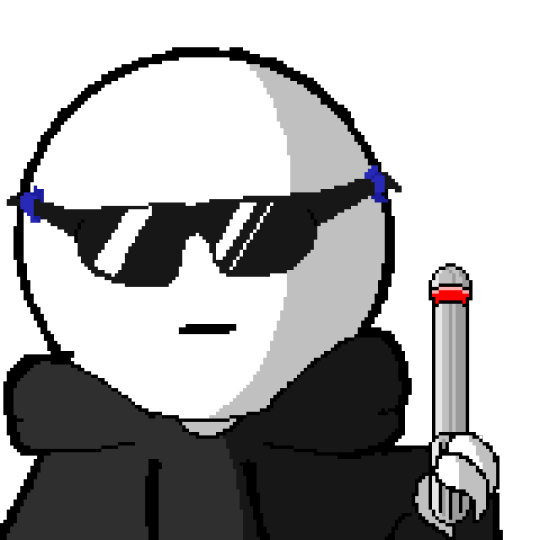
You instruct the audience to quickly stare into the red light on your Pen.
TA: no more comment2 on the horn thiing. iit never happened actually.
44 notes
·
View notes
Text
The homestuck website is still down so here are some alternatives
(Mainly making this post to easily direct people where to read it)
The Unofficial Homestuck Collection
By far the best way to experience the comic in its original form but can only be used on PC. (However someone made a method to run it on mobile here but I cannot attest to how good this method is)
MSPA To Go
Mirror of the old MSPA site designed to work best on mobile. It however does not have the epilogues. (You can however read the epilogues via the next option)
Homestuck Epilogue Ebook
Best way to read the homestuck epilogues on mobile currently IF you can find a ereader app that properly supports colour text. I personally have been using this EPUB reader website with my firefox set to "desktop site" and it words like a charm. It has a few formatting issues (namely a few lines left uncolored) but othee then that it works like a charm.
I am leaving this pinned to my profile for the forseeable future so enjoy.
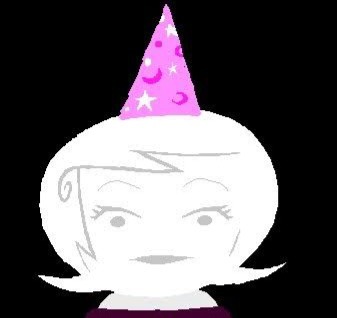
5 notes
·
View notes
Note
Hello monsieur davekatsucks. Sorry if this is a lot but your cherub talk reminded me. I am thinking about how hypocritically sexualized all the friendsim trolls were. You know, on the planet whose society's whole deal is that *only kids live there*... and then one of the authors said Chahut would be over 18 earth years of age like that matters? It's a whole different society man, they aren't considered adults until they go off planet, they would think you're a sicko, it's just another "erm she's actually technically 30 she's just a species that ages slower" argument (mixed with a fun flipped sprinkling of "erm actually the age of consent in some places is xyz"!) except all of the antis bought it this time because they personally thought the character was hot and that justifies as many loopholes in their logic as need be to make them not feel icky or ever have to think about their own capacity to do bad things. It's almost like the randomly generated number they stick on the wiki page for a character doesn't matter at all in comparison to how mature they look and act! You're so close to getting it!!!! Idk I'm tired. And randomly paranoid that tumblr won't keep me anon for this ask, if it's not then kmn ig
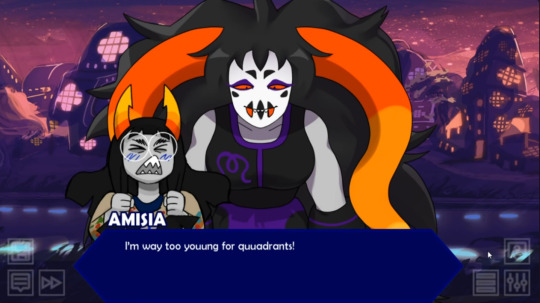
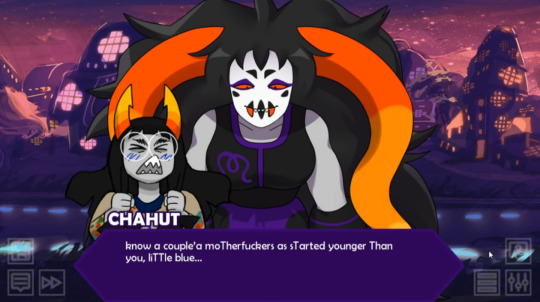
It doesn't help as well that Chaut also tells Amisia that she knows trolls YOUNGER than her that have already in quadrants. So that implies someone as young as say 3-4 years old, would have a boyfriend or girlfriend. Maybe she doesn't imply outright sex or do pailing, but it shows that trolls in Alternia are aware of how their species reproduce and the consequences if they contribute for the Mother Grub. Just try to comprehend someone as young as that would have to know about sex and said child is told if they don't contribute to sex, they will DIE. By that logic, if someone as young as that could start a quadrant, then that means age gap would be NOTHING since they are all kids and they need to fuck with someone else to make future troll babies. If Alternia is not just a dangerously environmental planet that grooms aliens about racism and violence, it's also a breeding ground for the young. The other time WhatPumpkin backed down on the Hiveswap Trolls being older than the humans was with Hiveswap Act 2 where Elwurd would flirt with Joey. It has been implied in Elwurd's route in Hiveswap Friendsim that she is or close to an age of adulthood that she would have to leave the planet when she tells MSPA Reader that she and her ex (Bronya) wanted to request combat assignments on the same ship so they won't be separated.
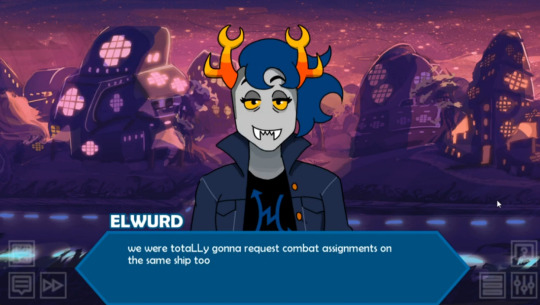
Nobody was sure how old Joey was and people think she is 12 or 13. It wasn't until Homestuck Team in a Curious Cat question that they clarify that Joey is 14 years old since she was born in the year 1980, that Elwurd was 16 and Bronya was 17. But that raises the question on what can be considered adulthood at this point if someone like Elwurd and Bronya could request early to be on the same group before they can leave the planet for good. And knowing that most Jadebloods would have be sent to isolation upon adulthood, a request for a cerulean and jade to be together might be rare, but could be possible if planned ahead of time. So would the years of 16-18 are considered the early stages of young adulthood before becoming legal adults? So wouldn't that mean Elwurd will still be older than Joey in that regard because in Elwurd's POV and stance within Alternian society, she is already an adult at that point. And yeah, the trolls in Friendsim are kind of sexualized. At least by the end in Lanque's route where Ardata reminds you that the Hiveswap Friendsim game is for MATURE AUDIENCES ONLY. And the Bad End in Lanque's route if you confirm you are an adult, is him and MSPA Reader (You) having a ONE NIGHT SEX STAND. Sure it fades out to black, but they don't beat around the bush that the two of them FUCKED. Lanque is stated in that same CuriousCat question that he is 18. So if the person playing the game was like 13 when they first played this game and would think MSPA Reader is the same age as them.... then yeah, that makes it all worse because of that 5 year age gap.
#homestuck#homestuck fandom#Hiveswap#Hiveswap Friendsom#Hiveswap Fandom#Hiveswap Act 2#Chahut Maenad#Amisia Erdehn#Elwurd#HS Elwurd#Hiveswap Elwurd#Elwurd hiveswap#Bronya Ursama#Lanque Bombyx#Joey Claire#Homestuck Team#WhatPumpkin#What Pumpkin#MSPA Reader
17 notes
·
View notes
Text
MS Paint Fan Adventures I'm thinking about and working on
I need to learn how to make an MSPFA account correctly, since any easy way doesn't work. But here goes the list!
Pre-Homestuck Inspired/Custom

My Little Pony is a retelling of the entire G4 MLP series in the style of an MS Paint Adventure, and not the Homestuck kind. I haven't watched the show since the start of this year and I gotta analyze every single scene from "Friendship Is Magic Part 1" to "The Last Problem" in order to get the story just like the show plot. It's currently in progress, but I didn't speed it up nor have I resumed it that much.

Camplife centers around 4 men in a camping site, eventually making way to a whole little town in a forest area. I've already done a few pages of it and have planned future events out of the comic, which I'll get to. It's planned to be half user controlled and half author controlled.
Homestuck Inspired

TGWTGQuest is about every member of the Channel Awesome community (Excluding the controversial ones, but even then they have to be mocked) and a bunch of bullshit adventures they partake in, mostly centered around the Nostalgia Critic. This might be more of a well-made shitpost than a real adventure because Channel Awesome's content really sucks. But hey, I began writing the planned pages for it! (I guess I have no clue how to make an MS Paint Adventure right, skull skull)

Caraku Levhat is about a young oliveblooded detective who resolves a bunch of federal issues and vast errors near and around the city he's in. The titular protagonist will probably have that Darkwing Duck personality if I can actually write that down.
The narration will be entirely built as a 1st person perspective from our main character, meaning everything that's told will be coming out of his own, hard-boiled words.
I can't read Homestuck so I'll just get some research outta the MSPA Wiki to help me be accurate a bit.
Jokes

Imagine a really bad gaming comic in the form of an MS Paint Adventure, minus the MS Paint and plus the Photoshop. Buckleyquest is basically most of the Ctrl+Alt+Del's comics (I have a terrible sense of humor so I can't tell if they're funny or not) that can be controlled through user input or author's choice. It has the same artstyle as the comic, albeit the first few panels, and sometimes, I have the potential to mock Ctrl+Alt+Del and its author in the fan adventure. It's gonna be the stupidest one I've made.

Dooj, simply put, is Homestuck, except a simple command will either change the storyline, change a character, add a character, or fuck everything up completely. And what's the command? DOOJ. Other commands made up as a weird word will also be included, such as MOOK, intended to revert the comic to its original story, and FOOP, which pauses the story automatically, shifting to the MSPA Reader's perspective.
Dooj may also include mockery against Homestuck, mockery against Andrew Hussie and his friends, sometimes shit I hate to write out, and cameos of characters and scenes from other webcomics.
I'm also making a similar project called KATEDREW MITCHUSSIE'S MAGNUM OPUS, which will mock Homestuck: Beyond Canon and will have a similar premise to DOOJ.
I was also planning to make a Jerkcity adventure but that would probably be controversial.
20 notes
·
View notes
Text
truly amazing, and finally providing context for this post:
now you have a sense how long this collab took 🙃
BADLY DRAWN HOMESTUCK GOES TO SEE THE FNAF MOVIE
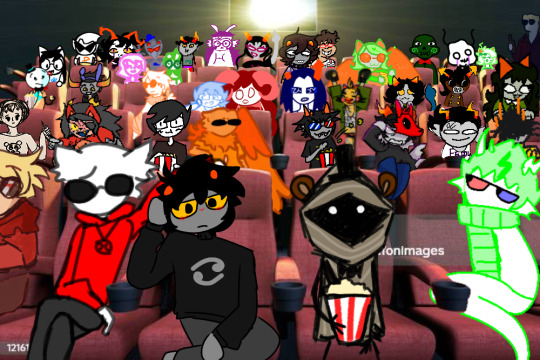
1K notes
·
View notes
Text
MspaReader: Be future MspaReader
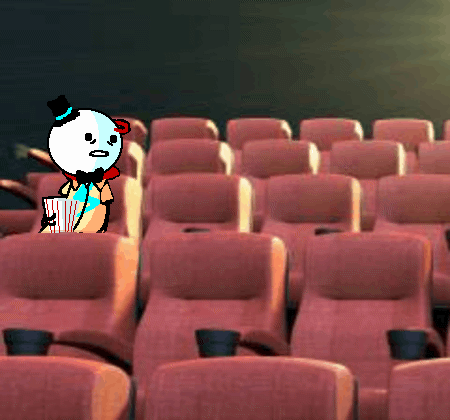
You are now future Mspa Reader, dressed as freddy fazbear, in an empty theater. You assume correctly that there's a reason why this situation unfolded, but that it's not important.
You seem to realize a little too late that the movie is over, so you zap away.
19 notes
·
View notes
Photo
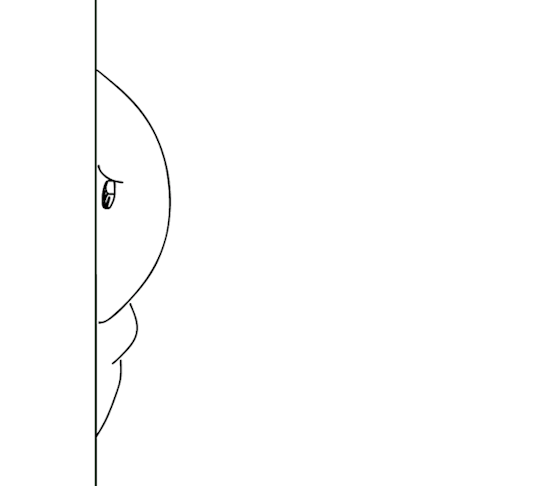
3am
#homestuck#hiveswap#friendsim#future friendsim#present actually#fuck#wanshi adyata#animation#animated#gif#daraya jonjet#mspa reader
34 notes
·
View notes
Note
i'd like to know what's your answer to Marvus's question; what does it mean to be non-canon within an extracanonical work?
You need to realize the meaning of 'Canon' in this context, and remember that Homestuck and the subsequent work with HS^2 and the Epilogues challenge you to think about what 'Canon' really means and why it does or doesn't matter.
Friendsim is 'Non-Canon'. What does this mean? It means that, within the larger context of Homestuck and Hiveswap, these events don't actually mean anything, they don't happen. MSPA Reader DOESN'T have any influence on the content of Homestuck proper. It is a side-story meant to showcase characters and give them depth and present them in a scenario where you can Befriend them.
And within THAT extra-canonical work, there exists a Main Timeline of events that happen. A continuity. There's different Endings, and the events of certain future chapters imply that some things Happened while others Didn't! Obviously MSPAR didn't Die, canonically, despite dying in so many endings, because we keep playing as them! Those endings are 'non-canon', they are merely what-ifs that diverge from the True Canon.
And yet.
Marvus' raises the question. What does that matter?
A 'What If' can give you insight on a character in different situations- How they'd handle different things, different choices or paths they can take. It may not affect 'canon', but it does affect things extra-canonically. The perception the Fans have of a character, the way they actions are seen. Even if they are entirely retconned out in the 'true' story, they serve a purpose, and depending on your preferences, these 'Non-Canon' events can seem even more relevant to understanding a character or the actual canon than what is presented in canon itself!
What DOES it matter that MSPAR's actions led them to a non-canon route? What DOES it mean that they are non-canon within extra-canonical work? Does that really make their emotions any less real for some reason? Does it make the moment less impactful? How does it inform the events of what WAS supposed to be canon? What does it say, about the world they find themselves in?
The question becomes even more interesting, when you remember that Homestuck's Universe acknowledges itself to be a story, and that characters actually remember things across Timelines, or require sacrifices from Doomed Timelines, or gain authorial control of the story.
If 'Canon' is going to put the Betas and Alphas and the Trolls through so much awful stuff, then isn't it morally correct for someone like MSPAR- An outsider with the power to change their situation, to do Something about it?
How much does 'Canon' matter when the characters within acknowledge their own fictional status and fight against Canon itself to free themselves?
When Official Work is rendered Non-Canonical, can Fanwork be acknowledged as having the same value?
Marvus' Question doesn't have a solid answer. It's a question meant to make you wonder about it. Do you care that the ending is non-canon? That you're ultimately going to just roll back the clock and pick the Correct Choice? Does it mean you 'wasted your time' by going into a dead end? What did you learn about MSPAR and Marvus? And, is it REALLY non-canon when MSPAR starts remembering even these Bad Ends and gains the power of changing where even Canon is headed?
👀
80 notes
·
View notes
Note
whenever i start thinking about my real age things get confusing real fast. i was young, basically a kid like everybody else but now its like i feel so, so old. like ive been around for a long time even if it took a while to remember it. and i did a lot of growing up during that lifetime.
im not sure how i am here now in all honesty nor do i think about it much, i dont know for sure if i went into dormancy or not when i decided to protect our timeline but i dont regret it. if i took an active role, id be making the mistake of all the others who tried to take control of the story.
i figured that much out from how many times i was pulled into a philosophical debate (read: a conversation made to make me doubt myself) asking whether or not the good i was trying to do for others was actually a good thing.
i guess in the end it did help me make a decision to let them live out their life from then on without intervening, but it was most likely just to get me out of the way and give me a bone to chew on so i wouldn't try to fuck with anything else now that i wasn't needed. and that? that rankles.
but at least i could make a difference for one timeline even if i couldn't for any others. it was a nightmare but i would do it again if it meant making sure they had a future that wasn't so full of grief. -mspa reader (#📖♠️)
🌼
#fictionkinfessions#fictionkin#📖♠️#mspareaderkin#homestuckkin#memories issue#canoning issue#mod party cat
3 notes
·
View notes
Text
And today is the day we power through the rest of chapter 3! The last three pages have been living rent free in my head since I first saw them, and by god I’m gonna fucking ramble on those as much as my brain allows - but first I need to get there. Well, I know there are more fantastic Izuku faces along the way, so I suppose I can live.
[No. 3 - Entrance Exam]
God, that’s an actual small city, what the fuck UA, how do you afford this? Izuku is trembling from nerves (and exhaustion, you can still see the eyebags on him). A picture of the crowds around him:
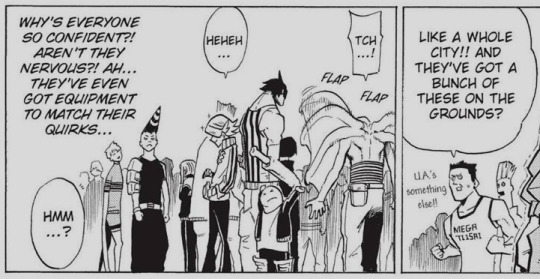
So there’s Shouji and Aoyama, along with Uraraka, and we know Iida’s here too, so that’s a fourth of 1a in the same arena. We also have the featured extras (right to left): Beaker (The Muppets), High School PE Teacher, MSPA Reader (Homestuck), Big Meaty Elbones, The Pompadour to Pierce The Heavens, and Slenderkid.
(Yes, before you ask, I will be giving all the extras names in the spirit of Bakugou.)
But yeah, Izuku notes everyone’s confidence and the gear that goes with their quirks, and then he notices Ochako, who is getting herself into the zone. He tries to shakily make his way over to thank her, but Tenya comes in again and stops him, telling Izuku that she’s meditating and wondering if Izuku’s there to interfere, which of course freaks out Izuku.
Engineer (TF2) recognizes him and calls him out:
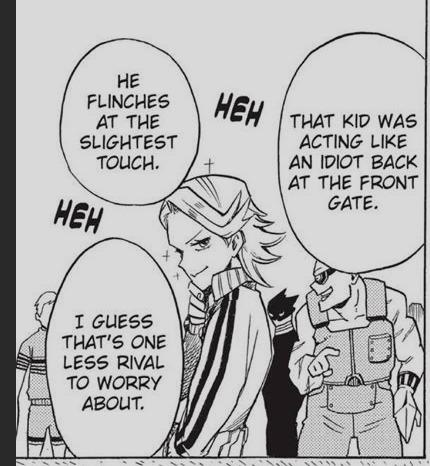
Hello Aoyama, yes we see you looking at the camera, good to know that’s not an anime-only thing. And that looks like proto-Tokoyami, who does appear to be the actual one next time we see him, so that’s six members of 1a in one zone. But yeah, everyone considers themselves lucky, which seems a bit silly when he’s just one out of, what was the number again? 1550 students per cityscape? I suppose this is something future Izuku is narrating, so maybe that’s just how he felt about it.
Anyways, the call to begin goes out, with everyone going ‘hmm?’ all at once in confusion. They all look up to the top of… what the fuck?
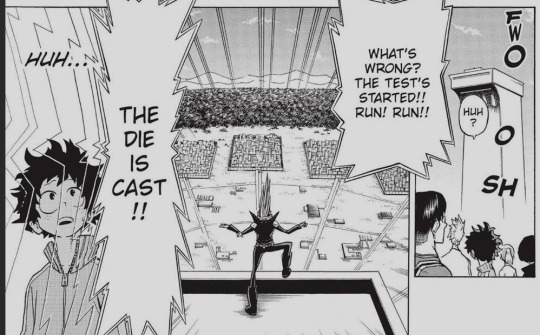
How fucking tall is that building?? When the cities are this big??
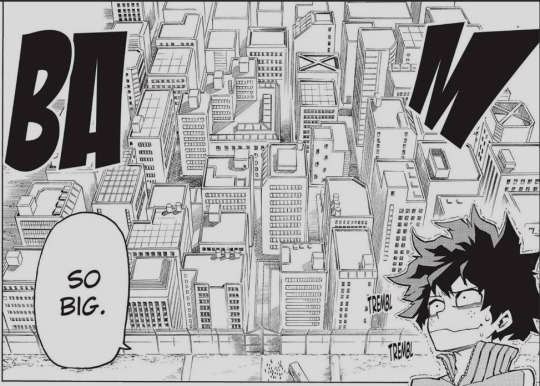
Is there an atmosphere up there? Is he halfway to low earth orbit? What the fuck UA. (Also poor Izuku, so many nerves.)
By the time Izuku catches on and turns around, the rest of the crowds have already gone off, including Ochako, Tenya, Tokoyami, and the extras Pompadour, Dudley Dursley, High School PE Teacher, Knock-Off Pussycat, and Skull Mask. He panics and starts running after, telling himself to calm down, that it’s fine, that he’s meant to do this, even as the crowds get further ahead of him.
We then flash back to the beach, with this fantastic face:
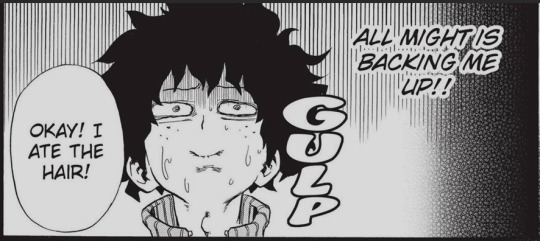
Hahaha poor kid. Izuku mentions he doesn’t feel himself transforming, and All Might laughs and notes that it needs time to digest and that he’ll feel it in a few hours. Izuku is flailing with nerves as he walks off, thinking about getting home for a shower and breakfast; All Might calls out to him, telling him that he might be a proper vessel, but he was put together in a hurry, and hasn’t had time to get used to the power, so prepare for kickback. He says there’s no time for a detailed explanation, and so we then zone back into the present as his words echo in Izuku’s head, saying that when using OFA, to ‘clench your butt and let your heart cry out, saying…’
Before it’s cut off with a one pointer crashing out in front of Izuku, literally - you can see the wall debris flying away.

Yeah, me too. The one-pointers are noted to be quirk but fragile while the robot that it’s target locked on him. Izuku sees it coming, but he can’t move and his body is shaking from the instinctive terror. He chastises himself, calling himself an idiot as he tears up-
And a laser slices through the bot, Aoyama giving the quick save. He thanks Izuku for the assist, but that he doubts they’ll meet again, giving Izuku a sparkly wink as he zooms off. Present Mic then announces six minutes left, and Izuku starts to panic and think about how bad the situation is.
We see him take in the situation around him:
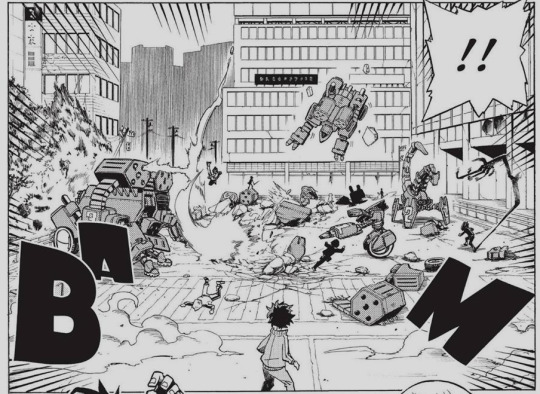
Yup, that’s definitely Tokoyami, and who might that dark-haired person be close to the middle?
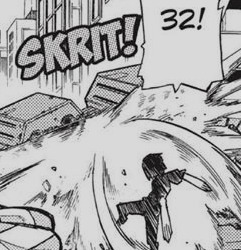
Yup, a discord friend pointed out that that’s Kirishima! So that’s no less than seven members of class 1a in the same battle zone! And considering how Ashido and Kirishima were in the same school and her name comes before his, like Katsuki’s comes before Izuku, I wouldn’t be surprised to know she’s in Katsuki’s battlezone.
(Imagine if all of 1a, sans the recommendation duo, were either in Katsuki or Izuku’s battle zones. The sheer odds of that happening…)
But yeah, Ochako is up to 28 points, Tenya to 45, and Eijirou to 32, all while Izuku realizes there are barely any enemies left. He’s freaking out, tearing up, and you can see just how fucking exhausted he is.
We shift over to the ‘teacher commentary’, where we can see Midnight and Thirteen in the back, and then Vlad, Cementoss, and presumably other teachers in front of and to the sides of them. They note how a wide battlefield with limited time brings out the best in the applicants - intelligence gatherers (featuring Shouji), mobility experts (Tenya), decision makers (Aoyama), and natural born warriors (Katsuki). The abilities the students need to preserve peace are judged by their points.
They note that that year has a bumper crop, but that that’s not confirmed yet, as they push the big button labeled ‘Yaruki Switch’. Which unleashes massive, multistory robots into the battle centers (and where the fuck were they hiding???)
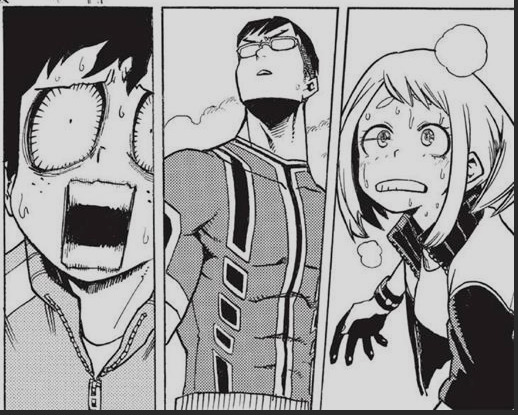
Yeah, me too, kids. Izuku thinks that that’s way too big to be a ‘gimmick’. It punches down into the street with a massive blow, sending wind and debris everywhere, and the other students run while Izuku is sitting there, frozen in terror. Tenya runs past him with barely a glance, while the teachers’ commentary continues - people show their true colors when faced with the zero pointer.
Izuku is in tears and yelling at himself as he picks himself up to run. He knows he has to get away while also getting points, but he’s still stuck at zero, and believes this’ll all be for nothing.
And so we get to the pages that have taken rent-free residence in my head for days now:
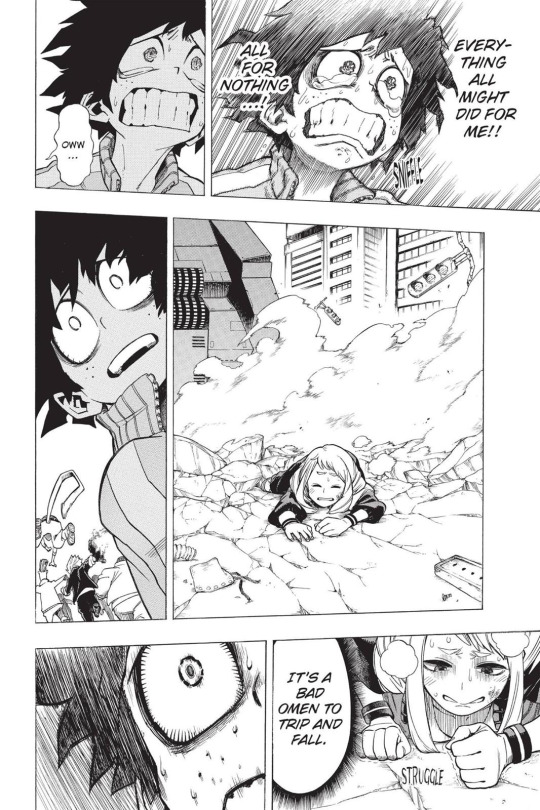
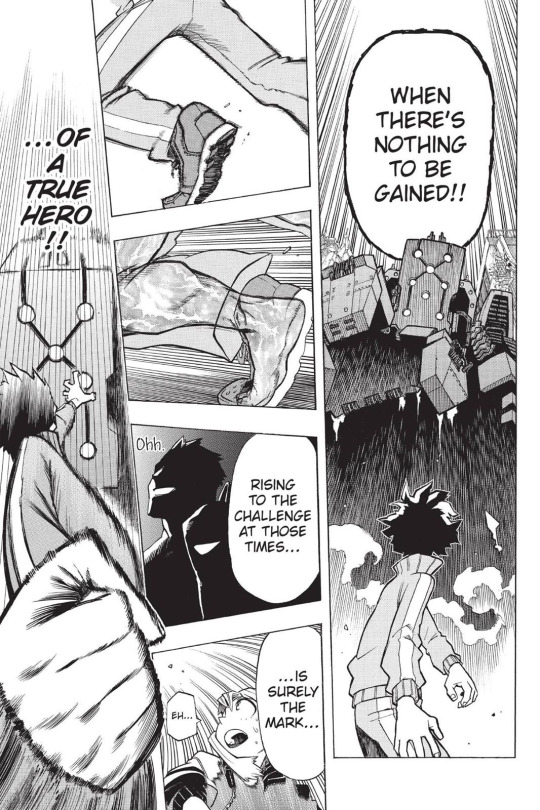
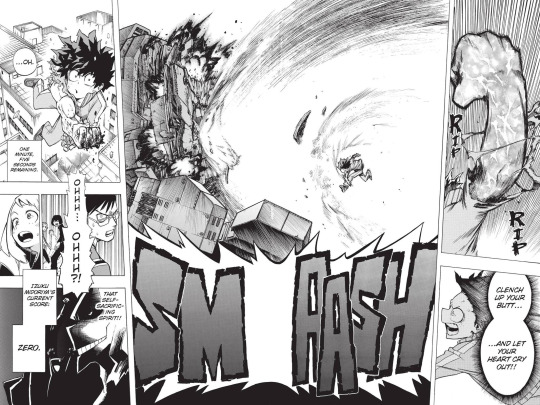
God just. The composition, the entire change in his thought process and demeanor because someone was in danger, the fucking smashing blow and the power behind it, everyone else’s reactions to him oneshotting the monstrosity, and that ominous ending, with Toshinori grinning while the narrative notes that Izuku’s current score is zero.
I’m just going to paste in my gushing from discord, to be clear how I feel about all this:
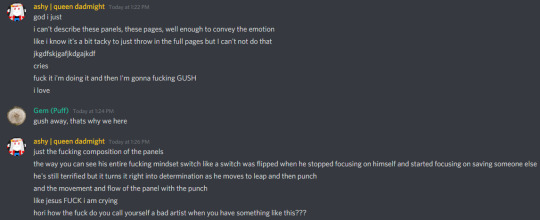
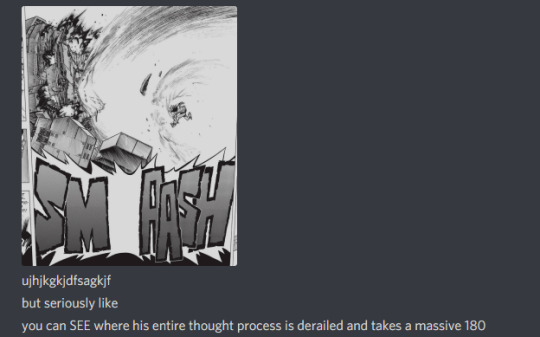
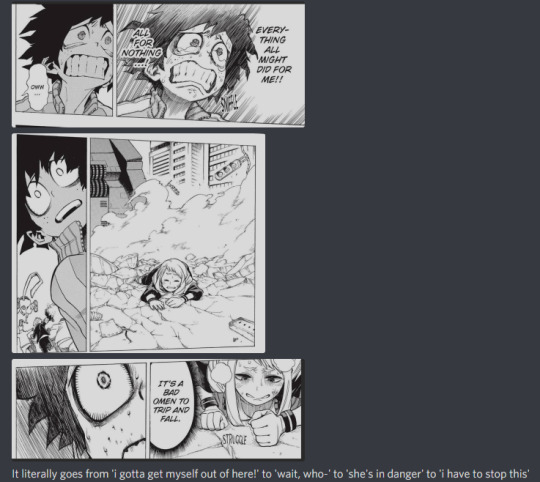
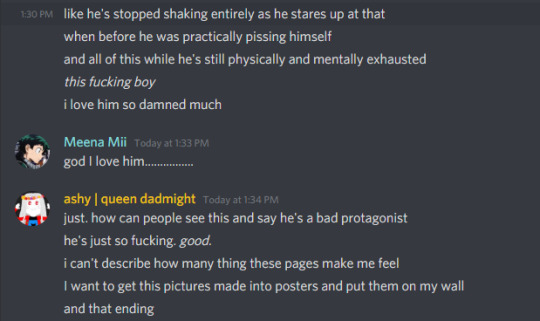
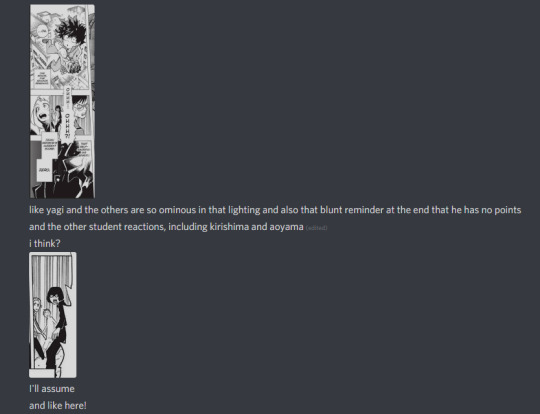
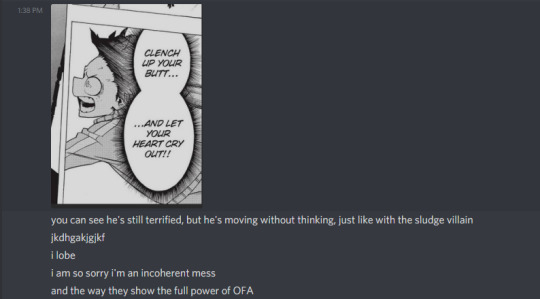
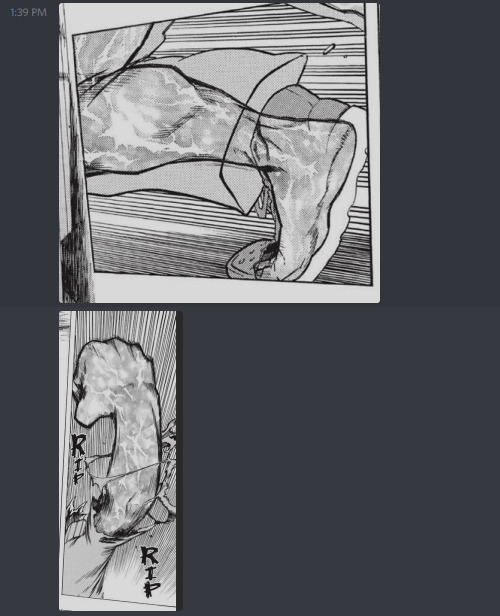

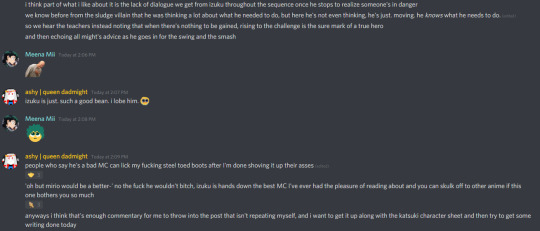
And no, I’m not particularly ashamed of all the gushing or the images or how much I repeat myself. I’m still feeling a whole lotta things from these pages and like. Jesus fuck if I wasn’t already in this fandom, I would be now.
#chapter 3#opening arcs#readthrough#boku no hero academia#my hero academia#midoriya izuku#uraraka ochako#iida tenya#yagi toshinori#aoyama yuuga#god I just#fucking love those last three pages so much#I cannot begin to describe the feelings they evoke in me#way more emotions than the anime ever did#god comics class did not prepare me for this#nothing did#oh my god#i've been on a spiritual journey and obtained enlightenment
79 notes
·
View notes
Text

Also went through another path with this story, It’s an AU where Mallek gets sent off planet like he feared, and ends up in a rebellion, 8 long years pass, and he returns home after the fall of the Empire. Thank you for the ask anon, this was another fun piece to write for. I hope you all enjoy this piece.
- mod kai
The large vessel lands in the open fields, the doors open numerous trolls exit the ship. All of them looking worse for wear, some of them were okay, and others looked like death, and among them was a taller troll, dressed in a fancy outfit, a jumpsuit with blue trimming, on his back a metallic backpack, and blaster pistol attached to his hip along with a series of gadgets and tech. His hair had grown out a bit, and he had facial hair, his eyes were heavy, there was a scar across his face, it was old, he got it during his first years off-planet.
Mallek Adalov, information specialist made spy for the empire, after reaching adulthood was forced to leave his home behind to fight in the ongoing conquering of the universe, the war and battle had hardened him, he was no longer that punk kid trying all he could to hack the system, control the world and save himself from being forced to fight in the war. He saw so much destruction, suffering, making new friends and losing them, putting his life on the line every day, and just barely escaping with the skin of his teeth.
It had become too much for him, and he had enough of it, defying his orders and refusing to do his job, execution was awaiting him, but before he knew he was rescued and found himself in the middle of a rebellion, it may have seemed hopeless, unwinnable but at least with these rebels he could have some measure of freedom, he could focus on his hacking skills, improving greatly in the few sweeps, and after a long battle lasting 5 years, and aid from the other planets, after centuries of dictatorship, the horrors committed against her people and the universe, Her Imperious Condescension was defeated along with the current heiress.
Alternia was free, and now the process of rebuilding and reorganizing the world. After so many years, the surviving adults were finally returning home, the rebellion would be helping all the world still intact from the Condesce’s onslaught. The aliens were still cautious of the remaining trolls, but the trolls who were part of the alliance ensured them that they would take care of their world and aid in the restorations of the many worlds left scarred. The hierarchy of Alternian society was completely shattered, and they were left to pick up the pieces, they had to be prepared for the inevitable power struggle, between the loyalist and the rebels.
But none of that mattered to Mallek right now, he was free. Free to do whatever he wanted…
He eventually made it back to his old place, to his surprise it was still intact, with a few holes, crumbling walls, but still standing despite. He had made some spots and picked up some food, he had tried so many delicacies from the other worlds he ventured to, but it was nice to have something homegrown. The world around him was still in ruin, but all he wanted to do right now was sit on his old couch, and have a nice cold drink. He tries the door handle however when he touches it, the door just falls open, there’s a strong odor that fills his nose when opens the door.
“Smells like home…” He says to himself, entering his old hive. It was exactly how he left it, didn’t look like anyone had been here in a long time, he glances around the room.
He throws off his backpack and unbuckles his gadget belt, tossing them onto the green sofa, and sitting down beside them, a sigh of relief, he grabs a soda can from the bag he had been carrying in his hand, cracking it open and taking big gulps from the can. “Ah…” He leans back to the dusty piece of furniture, a wave of tiredness hits him, it was hard to believe that it was finally over and that he was back here after 8 long years of being off-world.
This would be the point where he’d turn on his TV, but there was a massive hole in that spot, giving a lovely view of the outside, he was really gonna have to get the repairs done to his hive soon…
“Wow, this place has certainly seen better days huh?” A familiar voice pulls Mallek back from his thoughts, the sound of a few footsteps walking over and around the mess. “It smells like death, you should really open a window or something.” Another voice, rather sarcastic and taunting speaks, which makes Mallek chuckle, he turns back to see three friends.
“Hey there.” Mallek smiles seeing Diemen, Galekh and MSPA reader standing there, all much older, the blueblood was still wearing a suit as always, Diemen was still short but he had grown twice his size, his hair was more shaggier, on his back was a giant RPG, and the small little alien friend he met all those years was still the same, wearing his old hoodie, they remained the same, barely aged but still looking worse for wear like the others.
The four of them sat there on Mallek’s couch, each of them holding a canned beverage, the four friends just sit there a silence between them as they just look the night sky, the city in the distant, it was rather peaceful looking, but there was that underline feeling, something that none of them wanted to address. The future…
“It’s really weird to be back here isn’t it?” Diemen was the first to say something, he was last one to have to leave Alternia, one year after Mallek and Galekh had to leave.
“Yeah, it’s all still here, it’s the same and yet different.” The blueblood responds as he had been to his old hive, as well, lucky for him, it was still more intact than Mallek’s place.
“I got so many weird looks from some other trolls on my walk to my old hanging spots.” Diemen chuckles before taking a sip from his drink. “It’s really odd for them.”
“I bet, they’ve never seen an adult troll before, it’s a spectale to them, everything’s gonna change…” Mallek says as he had gotten some strange looks, mixed with fear, awe, amazement and confusion from all the younger trolls.
“Honestly it was same when we went out there and met the adults who had been out there for a few sweeps.” The cerulean troll adds, it was interesting to meet older trolls when he was shipped out.
“Still, it would be best to keep a low profile with everything, being adults is one thing, but being members of a known rebellion who brought down the empire makes for targets huh?” The small alien says, as these three had been part of the large rebellion just after a few years in space.
“Yes, the other highbloods are in a chaos, the heiress and the empress are dead, a lot of the subjugglators have been arrested, captured or dead.” Galekh says, as the highbloods who supported the Empress are in disarray.
“Hey now, let’s not get so political and serious… We all know full well that things are gonna change, for better or for worst, and it’s not gonna be easy. But right now, let’s just have a few cold ones, enjoy a meal and be thankful that the long war is finally over, and a new era begins, or whatever.” Mallek raises his half drunken can as if it were a glass.
“To lost friends, and new beginnings.” Mallek says before chugging the rest of his can, crushing against his head and tossing it to the ground, Diemen and MSPA read mimic his actions, and Galekh just takes a light sip.
“I’m not doing that, but the sentiment is appreciated.” Galekh says fixing his glasses slightly.
“Hey Mallek, can I bunk here tonight?” Diemen asks his friend, the troll just looks at him, and glances around the room again.
“No worries, we’ll need to check the rooms… Don’t wanna give a space and the walls collapse on ya while you sleep.” He teases his friend, as he had only ventured as far as his living room.
“Oh, if you’re offering rooms, I’d like one.” The alien raises his twig arm up like a kid.
“Okay, okay, you guys are welcome to crash here. What about you, think we’ve got enough room here.” Mallek is more than happy to accommodate Galekh along with the others.
“Oh no, my home is still in mint condition more or less, and there are some other things I must attend to before the night is up… I must be off now, please try not to get into too much trouble you three.”
“Yes sir.” MSPA salutes the tall indigo troll, who just smiles faintly at the other.
Galekh leaves the trio soon after and Mallek guides the others to the guest rooms, it’s all very dusty and cracked walls, and the mess left behind by a younger Mallek but there was a comfy spot or pile of junk to rest on. The three decide to share a room, still before the night ends they continue talking, making small jokes and tomorrow was a new day, and bright new beginning or the start of something more sinister, but for now Mallek was just thankful that those closest to him were safe and with him. Almost everyone, as the troll reaches into his outfit pulling out a small old photograph, it was faded but he smiles faintly at the image of him and the dear friend that he had lost...
#mod kai#mallek adalov#diemen xicali#MSPA reader#galekh xigisi#hiveswap friendsim#hiveswap#writing#fanfiction#ask#ask answered#bittersweet#canon divergent au#older au#anonymous
40 notes
·
View notes
Text
All Homestuck characters as of Nov 7,2020
This list includes characters from Homestuck,Homestuck^2,Hiveswap,& Friendsim! Please tell me if I missed anyone!
BETA HUMANS John Egbert(ghostyTrickster/ectoBiologist)/Heir of Breath/June Nanna Egbert Rose Lalonde(tentacleTherapist)/Seer of Light>Rosebot Dave Strider(turntechGodhead)/Knight of Time>Davebot Mom Lalonde Bro Strider Jade Harley(gardenGnostic)/Witch of Space/Grimbark Jade Grandpa Harley/Jake Harley/Pa Harley Future Dave>Davesprite fedoraFreak Dad Egbert/pipefan413
ALPHA HUMANS Poppop Crocker Jane Crocker(gustyGumshoe)/Maid of Life Mom Lalonde Bro Strider Roxy Lalonde(tipsyGnostalgic)/Ro-Lal/Rouge of Void Dirk Strider(timaeusTestified)/Di-Stri/Prince of Heart/Ultimate Dirk Nanna English Jake English(golgothasTerror)/Page of Hope Dad Crocker
OTHER HUMANS Colonel Sassacre Harry Anderson Egbert(thespiansGlamor) Tavros Crocker(glutinousGymnast) Yiffany "Yiffy" Longstocking Lalonde Harley Avril Thorpe Imode Kurita Silas P Beauregard III Joey Claire Jude Harley A. Claire
LUSUS B Crabdad>Crabdadsprite B Dragon Lusus>Dragonsprite B Mother Grub>Mothersprite B Tinkerbull>Tinkerbullsprite B Goat Lusus/Goatdad>Goatdadsprite B Bicyclops>Bicyclopsprite B Pounce de Leon>Pouncesprite B Ram lusus B Spidermom>Spidersprite B Aurthour>Aurthoursprite B Seahorse Lusus>Seahorsesprite AN Pyralspite ZOOSMELL/slugmeister CORNIBUSTER
ANCESTOR TROLLS Betty Crocker/Batterwitch/Baroness/Her Imperial Condescension/The Condesce The Signless/Sufferer Neophyte Redglare The Dolorosa The Summoner Grand Highblood/Unknown Subjugglater The Ψiioniic/Helmsman The Disciple The Handmaid Marquise Spinneret Mindfang E%ecutor Darkleer/Expatri8 Orphaner Dualscar
BETA TROLLS Feferi Peixes(cuttlefishCuller)/Witch of Life Karkat Vantis(carcinoGeneticist)/Knight of Blood Terezi Pyrope(gallowsCalibrator)/Seer of Mind Kanaya Maryam(grimAuxiliatrix)/Sylph of Space Tavros Nitram(adiosToreador)/Page of Breath>Tavrosprite Gamzee Makara(terminallyCapricious)/Bard of Rage Sollux Captor(twinArmageddons)/Mage of Doom Nepeta Leijon(arsenicCatnip)/Rogue of Heart>Nepetasprite Aradia Megido(apocalypseArisen)/Maid of Time>Aradiasprite>Aradiabot Vriska Serket(arachnidsGrip)/Thief of Light Equius Zahhak(centaursTesticle)/Heir of Void Eridan Ampora(caligulasAquarium)/Prince of Hope
ALPHA TROLLS Meenah Peixes/Thief of Light Kankri Vantas/Seer of Blood Latula Pyrope/Knight of Mind Porrim Maryam/Maid of Space Rufioh Nitram/Rogue of Breath Kurloz Makara/Prince of Rage Mituna Captor/Heir of Doom Meulin Leijon/Mage of Heart Damara Megido/Witch of Time Aranea Serket/Sylph of Light Horuss Zahhak/Page of Void Cronus Ampora/Bard of Hope
HIVESWAP FRIENDSIM TROLLS Ardata Carmia Diemen Xicali Amisia Erdehn Cirava Hermod Skylla Koriga Bronya Ursama Tagora Gorjek Vikare Ratite Polypa Goezee Zebruh Codakk Elwurd Kuprum & Folykl Remele Namaaq Konyyl Okimaw Tyzias Entykk Chixie Roixmr Azdaja Knelax Chahut Maenad Zebede Tongva Tegiri Kalbur Mallek Adalov Lynera Skalbi Galekh Xigisi Tirona Kasund Boldir Lamati Stelsa Sezyat Marsti Houtek Karako Pierot Charun Krojib Wanshi Adyata Fozzer Velyes Marvus Xoloto Daraya Jonjet Nihkee Moolah Lanque Bombyx Barzum & Baizli
OTHER TROLLS His Honorable Tyranny Mierfa Durgas~fantroll Nektan Whelan~fantroll Vriska "Vrissy" Maryam-Lalonde(adamantGriftress) Swifer Eggmop Cliper Borden Alfonz Motter Ataxia Xefros Tritoh Dammek Trizza Tethis Xultan Matzos Dromed Baktar Cridea Jeevik
SBURB/SGRUB B Wayward Vagabond/Warweary Villein/The Mayor B Peregrine Mendicant/Parcel Mistress Black Queen B Authority Regulator/Aimless Renegade B White Queen/Windswept Questant Black King B White King/Writ Keeper Doc Scratch/Mr. Vanilla Milkshake Genesis Frog/Bilious SlickKernel
DENIZENS Typheus Cetus Hephaestus Echidna Hemera Nix Yaldaboth Abraxas
MIDNIGHT CREW B Spades Slick/Archagent Jack Noir/Scurrilous Straggler/Sovereign Slayer>Bec Noir Clubs Deuce>Courtyard Droll Diamonds Droog>Draconian Dignitary Hearts Boxcars>Hegemonic Brute
THE FELT Itchy Doze Trace Clover Fin Die Crowbar B Troll's Black Queen/Banished Quasiroyal/Snowman Stitch Sawbuck Matchsticks Eggs Biscuits Quarters Cans
SPRITES Kernelsprite B Harlequinsprite>Nannasprite B Crowsprite>Calsprite B Frogsprite Tavrisprite ARquiusprite Erisolsprite Fefetasprite Jasprosesprite^2 Davepetasprite^2 Gcatavrosprite
ROBOTS Con-Air Bunny/Wizard Bunny>Knitted Bunny/Indiana Jones Bunny>Weapon Bunny/Liv Tyler/Mr. Terry Kiser A Auto Responder/AR/Lil' Hal Huggy Bear/Lil Sebastian A Brobot A Squarewave/Zillywave A Sawtooth/Sawhoo
ANIMALS Jaspers/Frigglish>Jaspersprite B Bequerel>Beqsprite>Jadesprite Firefly/Serenity/Dr. Blinkbottom/Twinkly Herbert A G Cat/God Cat B Casey/Viceroy Bubbles Von Salamancer B Maplehoof B Vodka Mutini/Dr. Meowgon Spengler Halley Tesseract The Lone Gunbirds(Frohike,Langly,& Byers)
HORRORTERRORS Fluthlu Nrub'yiglith Oglogoth Gl'bgolyb
CHERUBS Caliborn(undyingUmbrage)>Lord English Calliope(uranianUmbra) Alternate Calliope/Possessed Jade
OTHER Lil' Cal MSPA Reader Ms. Paint Andrew Hussie/Hussiebot A Jake’s Brain Dirk
30 notes
·
View notes